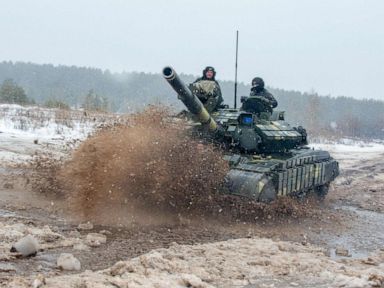
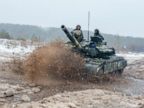

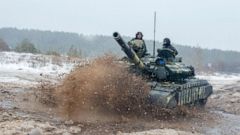
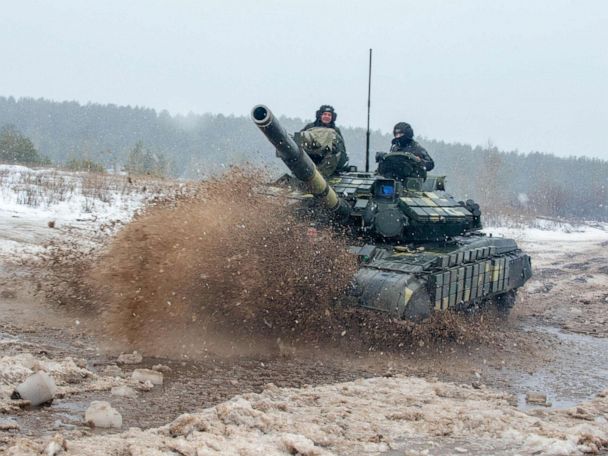
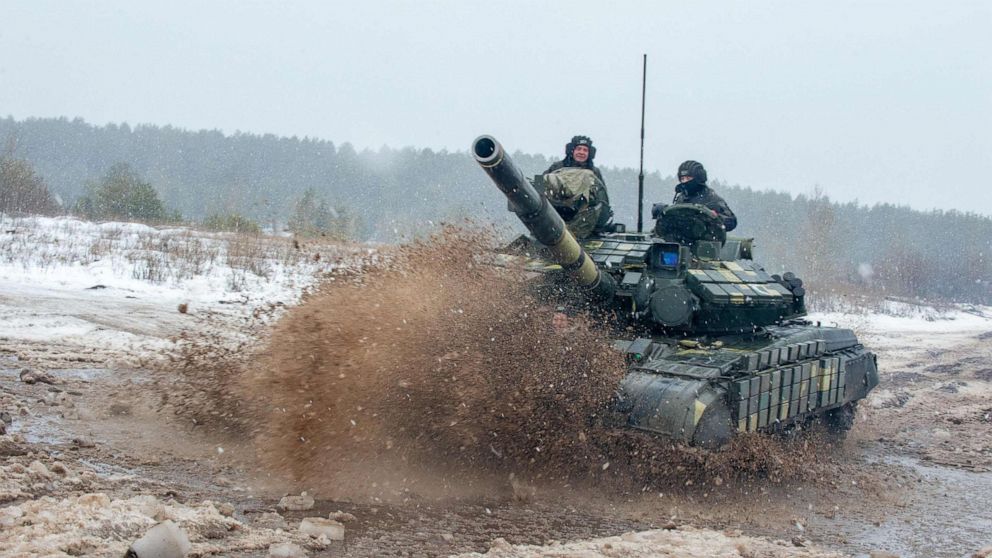
The U.S. issued a stark new warning Friday that a Russian invasion of Ukraine could begin during the Olympics.
“We can’t pinpoint the day, at this point, and we can’t pinpoint the hour, but what we can say is that there is a credible prospect that a Russian military action would take place even before the end of the Olympics,” U.S. national security adviser Jake Sullivan told reporters at the White House. The Winter Olympics, which are ongoing in Beijing, are scheduled to end on Feb. 20.
Secretary of State Antony Blinken, speaking in Melbourne, Australia, earlier Friday, shared the same message: “As we said before, we’re in a window when an invasion could begin at any time. To be clear, that includes during the Olympics.”
Sullivan said the United States still could not say whether Russian President Vladimir Putin had actually made a decision to invade.
But he said the situation had grown so dire that Americans in Ukraine should leave “immediately” — or at least “in the next 24 to 48 hours.”
“We don’t know exactly what is going to happen,” Sullivan said. “But the risk is now high enough, and the threat is now immediate enough that this is what prudence demands.”
Sullivan told ABC News Senior White House Correspondent Mary Bruce that he expected President Joe Biden to “engage by telephone with President Putin.” The last time the leaders spoke was Dec. 30.
A White House official later said the two men would speak Saturday morning.
Sullivan said Biden did not plan to put American troops’ lives at risk to rescue Americans who remained there.
“If you stay,” he said, echoing what said in an NBC News interview Thursday, “you are assuming risk with no guarantee that there will be any other opportunity to leave, and there is no prospect of a U.S. military evacuation in the event of a Russian invasion.”
Sullivan said the U.S. is reducing the size of its “embassy footprint” in the Ukrainian capital, Kyiv.
Sullivan went on to describe in vivid detail what could happen, including a “rapid assault on the city of Kyiv.”
“If a Russian attack on Ukraine proceeds, it is likely to begin with aerial bombing and missile attacks that could obviously kill civilians without regard to their nationality,” Sullivan said. “A subsequent ground invasion would involve the onslaught of a massive force with virtually no notice, communications to arrange a departure could be severed and commercial transit halted.”
Chairman of the Joint Chiefs of Staff Gen. Mark A. Milley spoke Friday with Chief of Russian General Staff Gen. Valery Gerasimov by telephone, a Joint Chiefs spokesperson said in a statement.
“The military leaders discussed several security-related issues of concern,” the statement said. “In accordance with past practice, both have agreed to keep the specific details of their conversation private.”
Earlier Friday, Biden held a call with transatlantic leaders to chart next moves as talks over Russia’s military build-up near Ukraine showed no sign of defusing the crisis.
Biden spoke about “coordination on both diplomacy and deterrence” with the leaders of Canada, France, Germany, Italy, Poland, Romania, the United Kingdom, NATO, the European Commission, and the European Council, according to the White House.
The president has remained largely silent on Ukraine over the past few days, instead holding public events focused on the U.S. economy.
The transatlantic call came as NATO warned Europe was facing a “dangerous moment.”
“This is a dangerous moment for European security,” NATO Secretary-General Jens Stoltenberg said Friday in Brussels.
European leaders have engaged in intense diplomacy with Russia and Ukraine over the past several weeks to avoid war in eastern Europe. But the talks have so far failed to yield much apparent progress.
France’s President Emmanuel Macron traveled to Moscow to meet with Putin, before meeting with Ukraine’s President Volodymyr Zelenskyy in the Ukrainian capital, Kyiv, the next day.
Russia and Ukraine held talks Thursday in Berlin, moderated by Germany and France, but after nine hours of discussion failed to even agree on issuing a joint statement.
Western officials had hoped that the latest round of the so-called “Normandy Format Talks” would push forward the diplomacy by Macron and other officials who have been shuttling between capitals over the past couple weeks.
The sides remained at an impasse, though, over Russia’s insistence that the Ukrainian government speak directly with Russian-backed separatist leaders in eastern Ukraine.
Biden said Monday that Americans currently in Ukraine should leave, and on Thursday, he repeated that message with more urgency.
“American citizens should leave now,” Biden Thursday said in an interview with NBC News. “It’s not like we’re dealing with a terrorist organization. We’re dealing with one of the largest armies in the world. It’s a very different situation and things could go crazy quickly.”
Senior U.S. officials say they do not believe Russia’s President Vladimir Putin has made a decision whether to invade Ukraine, even as he has amassed over 100,000 troops on Russia’s border with Ukraine.
The U.S. and other Western nations have warned of severe economic consequences to Russia if it does invade. Russia denies it plans to do so.
Meanwhile, on Thursday, Russia and Belarus kicked off 10 days of joint exercises in Belarus, north of Ukraine.
ABC News’ Patrick Reevell and Matt Seyler contributed to this report.

